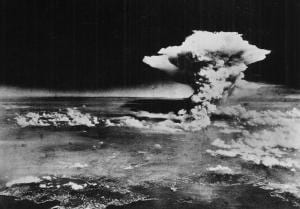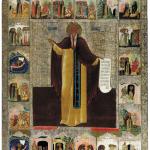
When heading the promises of sin, humans like to empower themselves, not for the sake of the common good, but for what they can get from other. That is, sin tells them to empower themselves so that they can dominate and control others. Since it does not know how to create, that is, create ex nihilo, sinful humanity likes to express its power in its ability to destroy, that is, engaging the power for the sake of negation, trying to wipe out that which exists. The more it can wipe out, the more powerful it feels, and the more it glorifies itself in a demonic imitation of divine glory. When people feel such power in their being, they feel that no one can judge or criticize them, because anyone who dares do so will meet the might of their destructive power and be destroyed. So long as this will-to-power, connected with the human desire to be like a god, to be what it thinks it is to be godlike, remains, it corrupts and destroys what humanity touches.
God, on the other hand, has true power and glory, and uses it, not to destroy, but to create, to enliven, to allow others to share in the bounty of his transcendent being. Whatever humanity destroys through its corruption, through its turn to sin, God can fix with his true power. Human power is powerless against true power, and yet, humanity likes to think of itself as possessing real power and those who do not act with such destructive power as being powerless. Thus, God seems powerless, so long as power is connected with destructive might. Nonetheless, whatever is destroyed by humanity is able to be given rebirth in God, to even be made greater than it was before its destruction. This is what Jesus shows us in the resurrection: the powerlessness of God is truly more powerful than the power humanity wields for itself.
And yet, humanity rebels. Every time it encounters the power found in the supposed powerlessness of God, it tries to overcome that power with its own might. It accumulates more and more destructive power, wields it, and unleashes its wrath. But God continues to reveal his true power, the power of love, to counter all human claims to power. Thus, on one day, August 6, we can see the two claims of power side by side, the human will to power revealed in the terrible and evil act of destruction at Hiroshima with God’s revelation of the divine glory, the divine light of Thabor, the uncreated power of God which cannot be undermined.
Seventy-five years ago, the human will to power showed that it was willing to destroy the earth itself in order to gain total control over others. There was no need to use the bomb. Japan was ready to surrender. There was going to be no long-term war. Winning the war was not the point. The war was already won. Trying to be like a god was the point. But the more we grasp for power, the more we try to be like a god through our own might and power, the further from God we have become. And the further from God we become, the more destructive we become, and the more we have to remind us of the evil which we can and do in our own name. Pope Benedict XVI, drawing upon this fact, preached:
In possessing himself of the energies of the cosmos “fire” the human being seems today to assert himself as a god and to wish to transform the world excluding, setting aside or even rejecting the Creator of the universe. Man no longer wants to be an image of God but of himself; he declares himself autonomous, free and adult. Of course, this attitude reveals a relationship with God which is not authentic, the consequence of a false image which has been fabricated of him, like the Prodigal Son in the Gospel parable who believes that he can fulfil himself by distancing himself from his father’s house. In the hands of such a man “fire” and its enormous potential become dangerous: they can backfire against life and humanity itself, as history unfortunately shows. The tragedies of Hiroshima and Nagasaki, where atomic energy used for the purposes of war, ended by sowing death on an unheard of scale, serve as a perennial warning.[1]
We can and should learn a lesson from what we have done. We can destroy, but such destruction is not good. We can try to become like a god, but when we grasp for power, we will not be like God. We should see with great sorrow the fruit which we have chosen for ourselves and repent, turning away from the evil which we have done. We should turn to God, to look for true power, the power of life, the power to create, the power to nurture, that is, the power of love, and be enlightened by it. This is what we are called for. We shall be like God, but only if we first accept our own “powerlessness” instead of trying to grasp for power for ourselves. We shall be like God: we shall join in the “powerlessness” of God and in so doing, we will find the “powerlessness” which we have accepted leads to true power, true glory, which radiates in us and through us and into the world. “You will do well to pay attention to this as to a lamp shining in a dark place, until the day dawns and the morning star rises in your hearts” (2 Ptr. 2:19b RSV).
On the same day which humanity tried to deify itself with its great abuse of power, we remember the glory of the transfiguration, when Jesus, the God-man, revealed his true glory, a glory which he is willing to share with us. If we want it, we must first empty ourselves of all claim to power for ourselves:
And after six days Jesus took with him Peter and James and John his brother, and led them up a high mountain apart. And he was transfigured before them, and his face shone like the sun, and his garments became white as light. And behold, there appeared to them Moses and Elijah, talking with him. And Peter said to Jesus, “Lord, it is well that we are here; if you wish, I will make three booths here, one for you and one for Moses and one for Elijah.” He was still speaking, when lo, a bright cloud overshadowed them, and a voice from the cloud said, “This is my beloved Son, with whom I am well pleased; listen to him.” When the disciples heard this, they fell on their faces, and were filled with awe. But Jesus came and touched them, saying, “Rise, and have no fear.” And when they lifted up their eyes, they saw no one but Jesus only.
And as they were coming down the mountain, Jesus commanded them, “Tell no one the vision, until the Son of man is raised from the dead” (Matt. 17: 1-9 RSV).
The Son of God emptied himself to become man, and in emptying himself he showed his true power. He did not need to dominate. He did not need to destroy. He emptied himself so that he could share with all the power and glory which is his, a power and glory which is not known through destruction, but by his love. God acts in love. God creates in love. God enlivens us with love. God refreshes us with love. God comes to us and raises us up with the power of love, but only if we die to the self, only if we stop all our desire to wield power for dominance for ourselves, will we be able to receive it. Peter, James, and John saw on Mt. Thabor the power of God, the power of love, the power which does not want to manipulate others, the power which does not destroy in order to manifest itself, the power which does stay idle, that is, the power which reveals itself in the way it gives of itself to others and enlightens all who come to it.
Humanity, cut off from God, knows power in the way it can manipulate and destroy. It uses that power to stay in control, to dominate others. It fears what happens when it becomes powerless, because it fears someone else will come and do to them what they have done to others. And yet, God became man, God emptied himself and became powerless, to show us the way to true life, to true glory, indeed to true power is to overcome that will to power. We must stop destroying the world and all that is around us. We must cut ourselves off from the desire to control; we must cut ourselves from all attempts to take power for ourselves, indeed, we must stop trying to make gods out of ourselves. If we do so, then we, like Peter, James and John, can encounter the light of Thabor, and realize what we thought was power was really an illusion which has been dispelled by the light of true power, true glory, which cannot and will not be contained.
[1] Pope Benedict XVI, “Eucharistic Celebration on the Solemnity of Pentecost” (5-31-2009).
Stay in touch! Like A Little Bit of Nothing on Facebook.
If you liked what you read, please consider sharing it with your friends and family!













